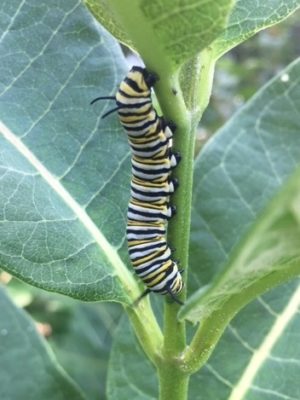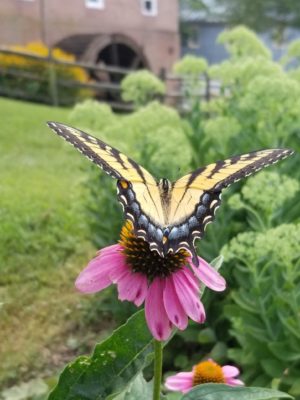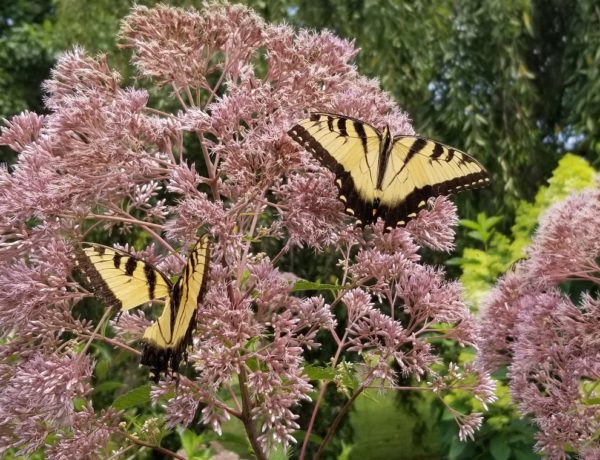Pollinators at Work in the Gardens
The gardens at the Union Mills Homestead have been graced the last few weeks by beautiful butterflies that flutter from plant to plant providing hours of entertainment for visitors to the site. Butterflies and other pollinators are certainly fun to watch, but also perform an important role in the garden.
Early Planning Pays Later in the Season

A Monarch caterpillar enjoying some milkweed in the Union Mills Homestead gardens. (Helen Hecht photo)
You may recall that the slogan for our Flower & Plant Market this year was “Rooted in History, Growing the Future.” That phrase evoked several aspects of the sale but one was the need for good landscape planning. We stressed that many of the plants offered at the sale would help your garden come alive with color and attract important pollinators, like beautiful butterflies. At the Union Mills Homestead our horticulturalist, Helen Hecht, carefully plans with an eye to shapes and colors, but also for making the habitat friendly to butterflies and other pollinators. Among the steps that can be taken to attract butterflies: provide native plants offering nectar and pollen as well as food for young caterpillars. Did you know that Monarch caterpillars only eat milk weed? While many gardeners weed out this plant, our horticulturalist makes sure she leaves them in the gardens so the caterpillars have plenty to eat! These efforts have paid off, if you look carefully there are many caterpillars now in the gardens at the Union Mills Homestead. And caterpillars are also an important food source for many bird species.
What are Pollinators?

A swallowtail butterfly enjoying an Echinacea at Union Mills.
Pollinators are anything or anyone that transfers pollen from one flower to another. Typical pollinators in a garden are butterflies, bees and hummingbirds, or other small creatures that are attracted to flowers in bloom. Pollinators are drawn to flowers for food, like nectar, and brush against the sticky pollen that they move from plant to plant. Pollinators play an important part in our ecosystem, and are responsible for reproduction in most flowering plants and the production of most fruits and vegetables. Did you know that the simple act of pollination is needed for one out of every three bites of food we eat? Some good sources for information are: www.pollinator.org and www.fws.gov/pollinators/ both of which we used for some of the information in this post. So come out and enjoy the gardens and the beautiful butterflies with a better appreciation of the important role these pollinators play!

